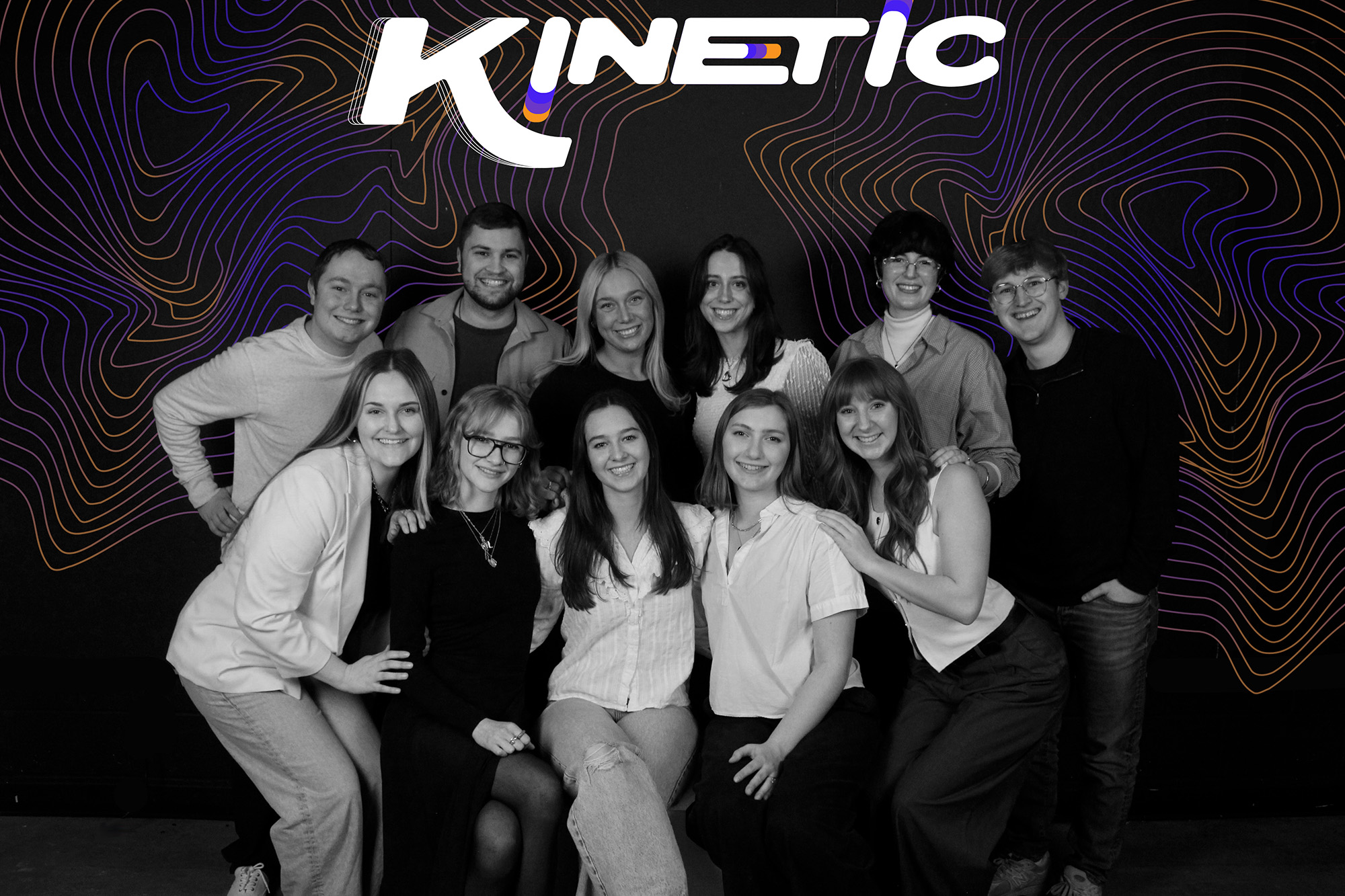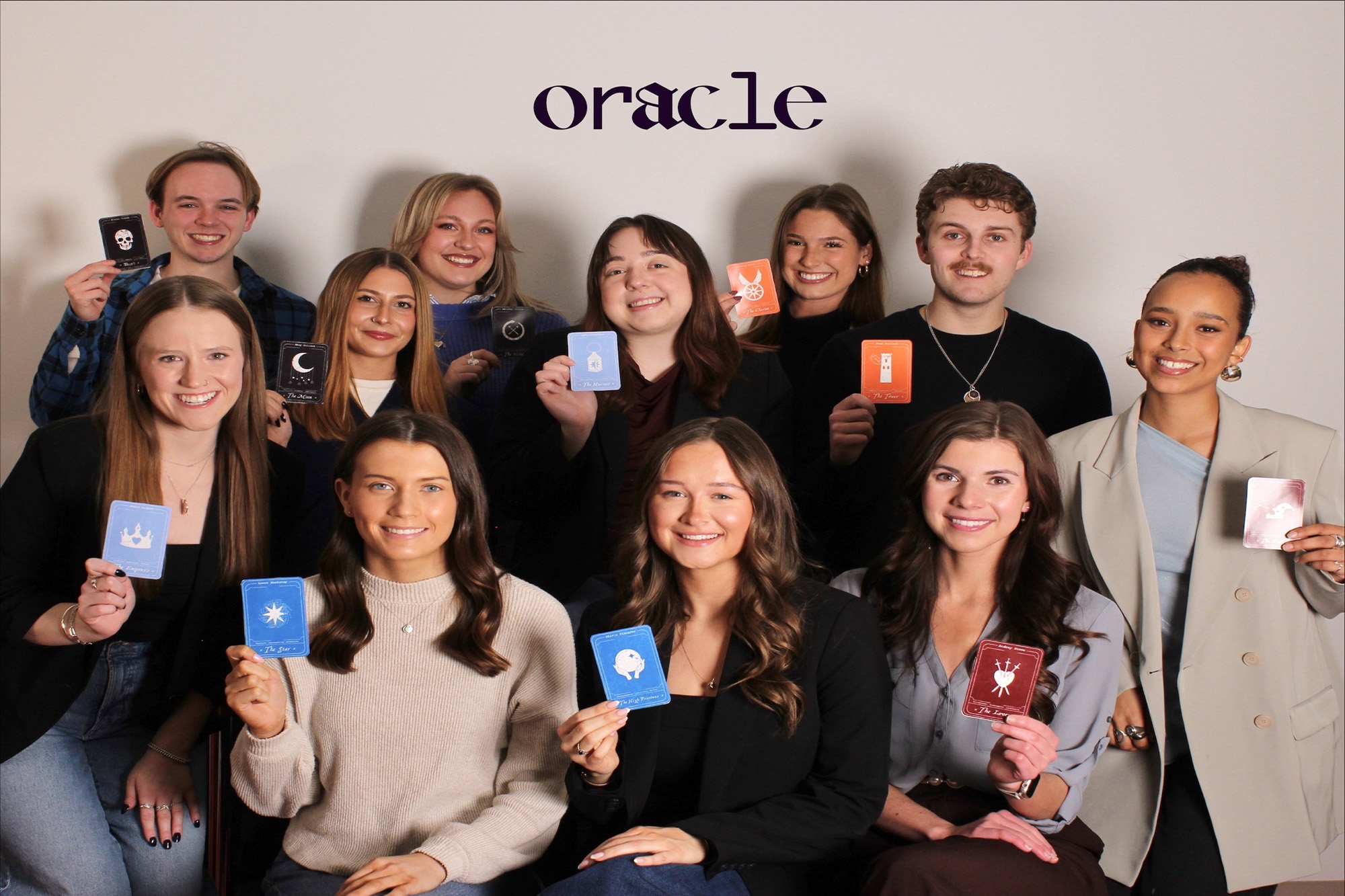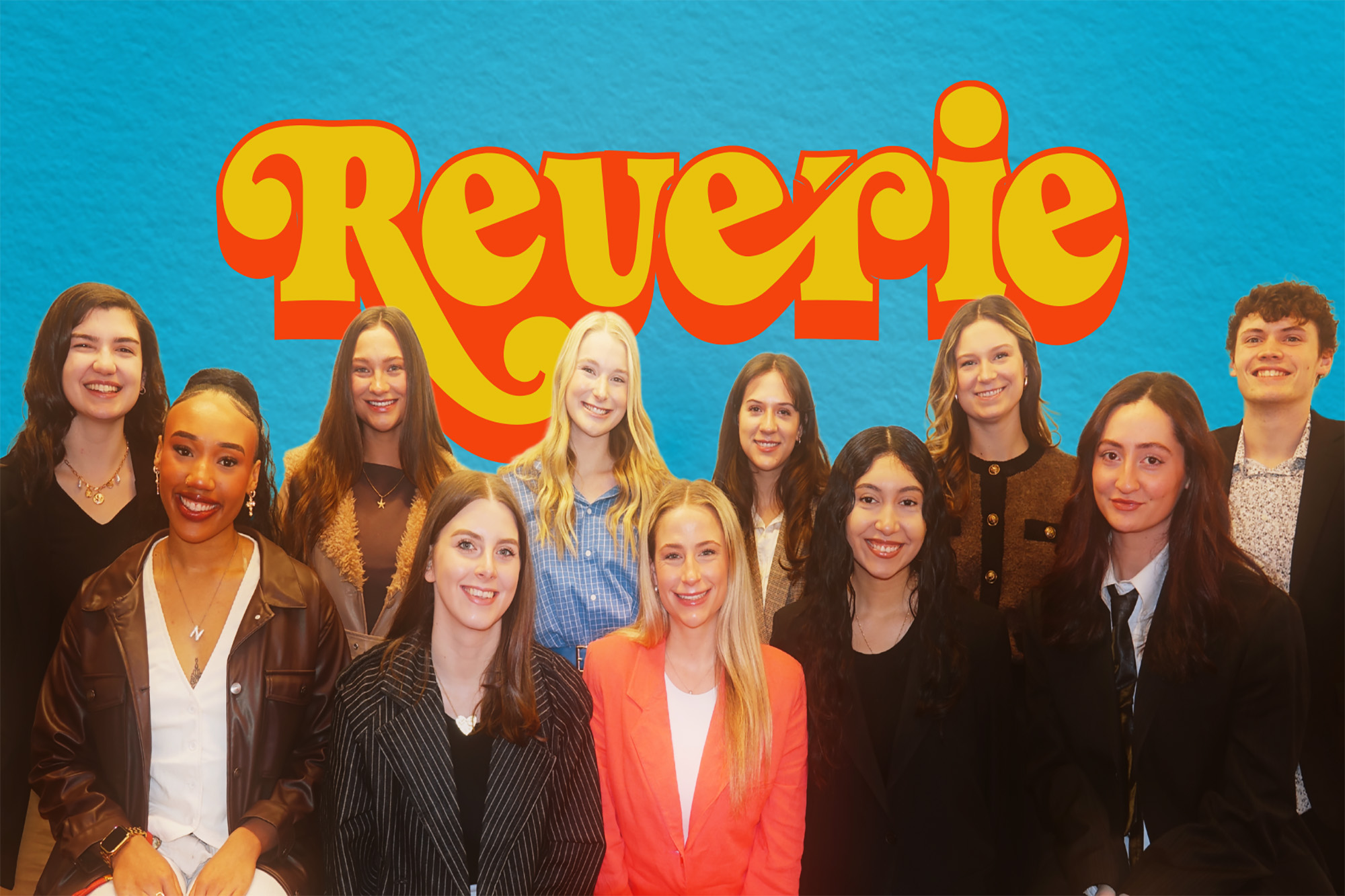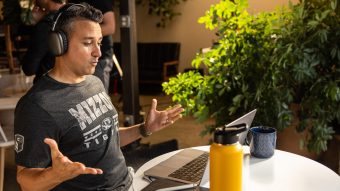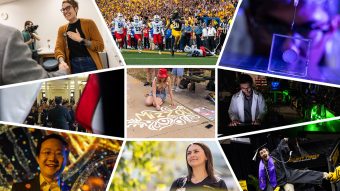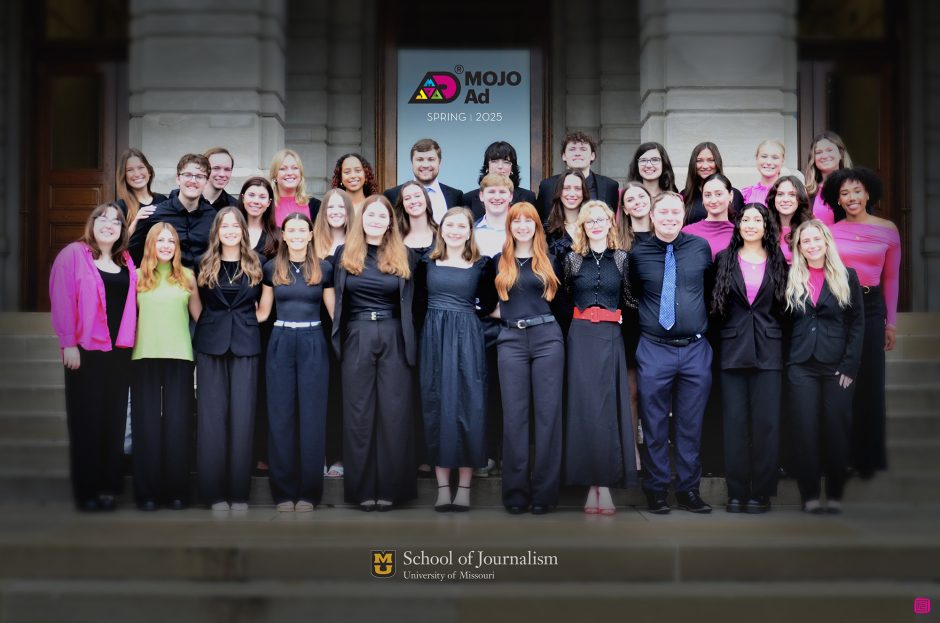
May 1, 2025
Contact: Cary Littlejohn, carylittlejohn@missouri.edu
Photo by Frank Corridori
At the University of Missouri School of Journalism, students in MOJO Ad — a premiere full-service, student-staffed advertising agency — aren’t just studying marketing trends. They’re leading the research, conducting in-depth analysis of the youth and young adult market and presenting their findings to some of the country’s biggest marketing agencies.
Their work culminates each spring with the State of the YAYA, a high-energy event to showcase what 18- to 24-year-olds think about issues such as artificial intelligence, taboos and the meaning of success. This year’s presentation will be held at 10 a.m. on Wednesday, May 7, in the Donald W. Reynolds Journalism Institute’s Smith Auditorium and available to viewers online via Zoom.
What’s a YAYA?
MOJO Ad coined the term YAYA to refer to the youth and young adult market of 18- to 24-year-olds and promptly became experts in the demographic. MOJO Ad’s expertise is inherent: The students know the market because they are the market.
The YAYA market represents a significant slice of the American population — more than 31 million people and a whopping $9.8 trillion in spending power. Understanding this highly sought-after demographic is vital to brand professionals, and that’s where MOJO Ad steps in: Its students serve as liaisons armed with insider information and bolstered by quantitative and qualitative research.
The State of the YAYA is MOJO Ad’s presentation on all its research. Three teams — named Kinetic, Oracle and Reverie this year — present their findings on different topics all through the lens of 18- to 24-year-olds.
Each team is made up of 11 members who assume roles such as copywriter, art director and digital strategist, and is led by account managers. The presentation proceeds as an intricate show of rotating speakers and precisely timed audio and video cues, and the countless hours spent researching and rehearsing are immediately apparent.
‘MOJO was my gold star’
The State of the YAYA is a prime example of the Missouri Method, which promotes learning by doing. The account managers know they, like the team members they supervise, are gaining real-world experience that will make them more marketable when searching for a job.
MOJO Ad is one of the capstone opportunities available to journalism students focusing on strategic communication. To join MOJO Ad, students participate in a highly competitive selection process culminating in interviews with strategic communication faculty. In the fall semesters, MOJO Ad students work on client-specific campaigns; for example, 2024’s client was NASA and its Artemis program. The spring semesters allow students to widen the lens from a single brand and consider an entire demographic: the youth and young adult market.
“We are people managers first,” Abigail Klapatauskas, account manager for team Reverie, said. “A lot of what we do is optimizing the talents we see with every person on our team.”
The students aren’t just gaining real-world experience but experience beyond their years.
“Multi-functional team leadership is something you’re not normally trusted with until you’re very senior in your career,” Caroline Schultz, account manager for team Kinetic, said.
The intensity of the work reflects that level of responsibility. The teams spend countless hours collaborating, researching and perfecting their final presentations.
“The challenge is spending time on anything else,” Klapatauskas said.
Olivia Plangger, account manager for team Oracle, agreed, joking that her teammates sometimes remind her to put down her phone and go to bed.
But the account managers don’t think twice about it.
“Everybody has bought into this process,” Plangger said. “Everybody wants to be here. Everybody has fought to be here because it’s where we wanted to be for a long time.”
The reasons are evident.
“I’m pitching to these massive companies at 21 years old, and I don’t know that I have the credentials for that necessarily, but at Mizzou, I do,” Schultz said. “At MOJO, I do. It’s really the opportunities and the stakes that MOJO provides.”
All three of the account managers agree that MOJO Ad, and Mizzou more generally, made these incredible opportunities possible.
“What’s really special about Mizzou is that people are looking out for you and want to see you succeed,” Schultz said. “And that’s really the point of MOJO as well. You’re given this enormous responsibility because you can do it, because someone saw something in you that you haven’t seen in yourself.”
Learn more about the three teams and their topics from the 2025 State of the YAYA.
Kinetic: Caroline Schultz
Tackling one of the hottest and most overwhelming topics of the moment — artificial intelligence — team Kinetic had its work cut out.
“Everybody’s talking about it; it’s so oversaturated,” Schultz said. “Honestly, people are kind of over talking about it.”
But ignoring AI isn’t an option, especially for youth and young adults poised to enter a workforce where AI is rapidly reshaping daily tasks.
“We’re going to be entering the workforce as it’s becoming the norm in industry, so our particular lens on AI is really, really important,” Schultz said.
Contrary to the stereotype of tech-obsessed youth, YAYAs aren’t entirely on board with AI.
“The research started to look dark and worrisome,” Schultz said. “We found that YAYAs don’t feel great about AI. It makes them feel guilty, it makes them feel dependent, they don’t have any ownership over their work, and it kind of just crept in without them really noticing.”
Schultz and team call it “The Uninvited Guest.”
“It’s almost like this shadow, or like in a scary movie when there’s something in your closet and you don’t quite know what it is, what it does or how to deal with it,” Schultz said. “YAYAs are dealing with that.”
Oracle: Olivia Plangger
Team Oracle was tasked with an eyebrow-raising topic: taboo.
“Taboo is something that was very exciting, very interesting but also a bit uncomfortable to research,” Plangger said. “We were exploring religion, sex, drugs and gambling — specifically sports betting.”
What they found was a generation reshaping traditional ideas of morality. Their research showed that as organized religion’s influence fades, youth and young adults are turning to the internet for guidance.
“We like to call it ‘Cyberscripture.’ That’s what we’re turning to — these influencers, these groups, these places as we make our decisions and form our opinions,” Plangger said.
And when it comes to taboos for today’s youth and young adults? They’re not disappearing but rather being rethought.
“We call it ‘The Great Rebrand,’” Plangger said.
Formally taboo behaviors aren’t just more acceptable to youth and young adults; they’re actively recast in a positive light. “For example, sports betting as an investment,” she said.
But there is still one major taboo for the demographic: judgment.
“We try to be so accepting as a generation, we’re almost afraid to express our definite opinions,” Plangger said.
Reverie: Abigail Klapatauskas
Team Reverie had one of the more abstract concepts to research: What does success mean to today’s youth and young adults?
“The biggest theme we kept seeing in secondary research was ‘happiness,’” Klapatauskas said. She and the team quickly realized that was too generalized to be useful.
When they started looking at their own qualitative and quantitative research on narrower conceptions of success, such as financial success, career-oriented success or success tied to tangible goals, they found a common theme: outsized confidence.
Generation Z is overly confident about their financial goals despite a lack of evidence that they should be.
“The math isn’t mathing,” Klapatauskas said.
At first glance, that overconfidence could be interpreted as naïveté. But team Reverie’s research told a different story.
“It comes from a deeper tenderness and empathy,” Klapatauskas said. “It’s really a coping mechanism to deal with the uncertainty in their lives.”
They’re seeking a sense that life is under control.
“Success, for YAYAs, unlike for previous generations, is not the attainment of a certain goal,” Klapatauskas said. “It’s the feeling of security and that they’ve reached some level of stability.”
